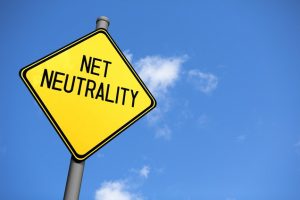 This week House and Senate Democrats introduced new legislation that would formally enshrine net neutrality into law. The bill itself is only three pages long because it simply enshrines the FCC’s 2015 net neutrality rules into federal legislation, providing formal Congressional approval for the FCC’s 2015 effort to declare ISPs as common carriers under Title II of the Telecom Act:
This week House and Senate Democrats introduced new legislation that would formally enshrine net neutrality into law. The bill itself is only three pages long because it simply enshrines the FCC’s 2015 net neutrality rules into federal legislation, providing formal Congressional approval for the FCC’s 2015 effort to declare ISPs as common carriers under Title II of the Telecom Act:
Here’s the Save The Internet Act of 2019 that nearly every Senate Democrat joined me in introducing today. 3 pages that will restore #NetNeutrality. Let’s pass it and make the internet free and open again. #SaveTheNet pic.twitter.com/BCYtcmcMe3
— Ed Markey (@SenMarkey) March 6, 2019

Why Better Financial Acumen is the Key to Law Firm Success in 2025
From training to technology, uncover the essential steps to futureproof your law firm in a competitive market.
At a lengthy press conference (video here), unified Democrats made it very clear that net neutrality was going to be a cornerstone of the party’s platform through the foreseeable future and likely through the next Presidential election. They also noted that a full markup and hearings on the dual companion bills could be expected sometime in the next few weeks. FCC Commissioner Jessica Rosenworcel lauded the new Congressional effort, rightly noting all the state and federal legal chaos the Pai FCC created in the wake of their factually-specious repeal:
“The FCC was on the wrong side of the law, the wrong side of history, and the wrong side of the American public when it rolled back net neutrality. The FCC’s deeply unpopular decision is being challenged in the courts, in statehouses, and in Congress. I applaud the effort announced today to reinstate open internet rules at the FCC. I’ll keep raising a ruckus to support net neutrality and I’m glad so many others are too.”
The problem for the Democrats, of course, is the immense success the telecom lobby has had at falsely framing net neutrality as a partisan issue. As a result, the bill may likely pass the House, but could very easily stall in the Senate. Even if it passes both houses, it would need to avoid a veto from Donald Trump, who has routinely opposed net neutrality despite pretty clearly not having the slightest idea what it actually is.
Survey after survey has shown that a bipartisan majority of Americans supported the rules and opposed the repeal. But ISP lobbyists work hard to encourage and inflame a partisan divide that shouldn’t exist on this subject (the quest for a healthier, competitive internet free of monopoly abuse). This results in a stupid partisan split in Congress with Democrats generally in favor of the idea, and Republicans staunchly opposed –usually under the (false) idea that net neutrality is draconian government over-reach.

How MyCase Accounting Transforms Legal Bookkeeping
This complete system built for lawyers simplifies the complex world of law firm finance.
In reality, net neutrality violations are just a symptom of monopoly power and the limited competition in broadband, subjects both parties have done a piss-poor job of addressing thanks to lobbying. In the absence of real competition, net neutrality rules are at least some basic safeguards to prevent giants like AT&T and Comcast from using their broadband monopolies to unfairly saddle and disadvantage competitors (despite industry claims this is a theoretical concern, it’s something that’s already happening).
Unsurprisingly, the Pai FCC was quick to issue a statement lambasting the proposal. The statement itself is a greatest hits of false Pai FCC claims to date, including the ongoing suggestion that the internet is seeing incredible growth thanks to their extremely unpopular decision to gut broadband consumer protections:
“The FCC’s return in 2017 to the bipartisan, light-touch approach to Internet regulation has been a success. This time-tested framework has preserved the free and open Internet. It has promoted transparency in order to better inform consumer choice. It has unleashed private investment, resulting in more fiber being deployed in 2018 than any year before and download speeds increasing by an astounding 36%. And it has proven wrong the many hysterical predictions of doom from 2017, most notably the fantasy that market-based regulation would bring about ‘the end of the Internet as we know it.’ The Internet in America today is free and vibrant, and the main thing it needs to be saved from is heavy-handed regulation from the 1930s.”
We’ve already discussed at length how these claims are bunk. One, the “record” fiber growth Pai’s FCC tries to credit for killing net neutrality was actually courtesy of fiber build-out requirements affixed to the AT&T DirecTV merger by the previous FCC (rather the opposite of less regulation). Two, the speed data the FCC uses was only current as of the end of 2017. Net neutrality rules weren’t repealed until June of 2018, meaning this growth occurred while net neutrality was technically active. It’s stuff like this that showcases why so many have a hard time taking the Pai FCC seriously.
Should this latest legislative gambit fail in the Senate or face Trump veto, the rules still have a shot at being restored via the ongoing lawsuit against the FCC. Should both fail, it will fall on the shoulders of voters to eject Luddite or cash-compromised lawmakers from both parties who prioritize protecting monopoly revenues over consumer welfare and the heath of the internet. At the very least, this looming vote should provide voters with a pretty clear 2020 scorecard as to which lawmakers actually have their backs when it comes to protecting an open and competitive internet.
New Bill Would Enshrine The FCC’s Net Neutrality Rules Into Standalone Federal Law
More Law-Related Stories From Techdirt:
FBI Director Chris Wray Needs To Shut The Fuck Up About Encryption
Major Labels Split On Support For Article 13; As Music Publishers Whine That They Can’t Make Money From Parodies
California Legislators Want To Make It More Difficult For Records Requesters To Get Documents From The Government